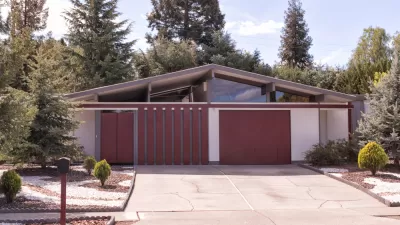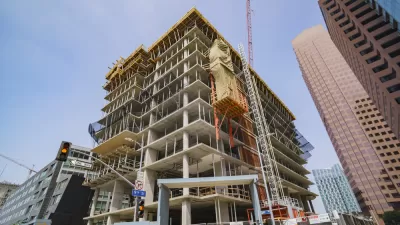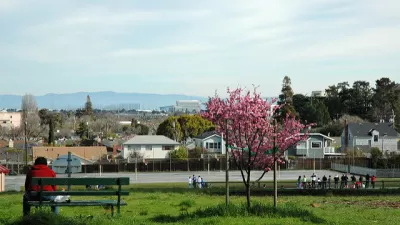A 35-year-old law is not living up to its moniker, the 'anti-NIMBY law'. A bill co-sponsored by a group associated with the YIMBY movement would fine cities $10,000 per housing unit if they fail to comply with the law.

One reason why California isn't building enough housing is because city councils ignore existing housing laws that, if followed, would result in more housing construction.
"A textbook example is playing out in Berkeley, which was sued last fall over a small housing development it denied," reports Katy Murphy, who covers state government for The Mercury News.
In February, the Berkeley City Council defied a court order to approve the development. The 35-year-old law — known colloquially as the “anti-NIMBY (Not In My Backyard) Act” — limits a city’s ability to reject a project that meets its zoning and land-use requirements.
Under a bill by Sen. Nancy Skinner, D-Oakland, cities like Berkeley that don’t comply with a court order would be hit with automatic fines of $10,000 per housing unit.
“SB 167 strengthens the Housing Accountability Act to help limit the denial of good housing projects that otherwise meet all local laws,” states Senator Skinner The bill, sponsored by the California Apartment Association and the California Renters Legal Advocacy and Education Fund (CaRLA), the legal advocacy arm of the YIMBY Party, has passed the Assembly and is before the Assembly Rules Committee.
The Berkeley lawsuit, now in its second iteration, was the first to be initiated by CaRLA. The group's second lawsuit, against the Contra Costa County suburb of Lafayette, was the basis of a "Sue the Suburbs" campaign after the city council approved a plan for 44 single-family homes on a property formerly considered for 315 apartments. The group lost at trial court, emailed spokesperson Sonja Trauss.
According to a 2014 blog by Reuben, Junius & Rose, LLP, the act, which had been used successfully against San Francisco and Stanislaus counties, could become a useful tool for developers to "protect well-thought-out, code and plan complying projects from unnecessary changes and size reductions." Should SB 167 become law, that possibility becomes more likely.
No net loss zoning
Finally, Sen. Skinner has also authored an accompanying bill, SB 166 on the subject of residential density and affordability, which "amends California’s existing ‘No Net Loss’ zoning law, ensuring that cities maintain an ongoing supply of identified sites for housing construction at each income level," according to her office.
For example, if a local government approves a commercial development on a site previously identified for housing, then SB 166 requires a city to identify a new site to accommodate this displaced housing.
The bill, co-sponsored by the California Rural Legal Assistance Foundation, Public Advocates, and the Western Center on Law and Poverty, has passed the Senate and is before the Assembly Rules Committee.
Other housing legislation advancing this term
- Three other key housing bills before the legislature, SB 2, SB 3, and SB 35 were the topic a post last week, "California's Housing Bills Fall Short."
- SB 35 and AB 199 are the topic of a commentary on how they would exacerbate the housing crisis.
- An inclusionary zoning bill, AB-1505 by Assemblyman Richard Bloom, D-Santa Monica, has passed the Assembly and is before the Senate Transportation and Housing Committee.
FULL STORY: Housing crisis: Will California force its cities to OK more building?

Study: Maui’s Plan to Convert Vacation Rentals to Long-Term Housing Could Cause Nearly $1 Billion Economic Loss
The plan would reduce visitor accommodation by 25,% resulting in 1,900 jobs lost.

North Texas Transit Leaders Tout Benefits of TOD for Growing Region
At a summit focused on transit-oriented development, policymakers discussed how North Texas’ expanded light rail system can serve as a tool for economic growth.

Using Old Oil and Gas Wells for Green Energy Storage
Penn State researchers have found that repurposing abandoned oil and gas wells for geothermal-assisted compressed-air energy storage can boost efficiency, reduce environmental risks, and support clean energy and job transitions.

Private Donations Propel Early Restoration of Palisades Playground
Los Angeles has secured over $1.3 million in private funding to restore the Pacific Palisades playground months ahead of schedule, creating a modern, accessible space that supports community healing after recent wildfires.

From Blight to Benefit: Early Results From California’s Equitable Cleanup Program
The Equitable Community Revitalization Grant (ECRG) program is reshaping brownfield redevelopment by prioritizing projects in low-income and environmental justice communities, emphasizing equity, transparency, and community benefits.

Planting Relief: Tackling Las Vegas Heat One Tree at a Time
Nevada Plants, a Las Vegas-based nonprofit, is combating the city’s extreme urban heat by giving away trees to residents in underserved neighborhoods, promoting shade, sustainability, and community health.
Urban Design for Planners 1: Software Tools
This six-course series explores essential urban design concepts using open source software and equips planners with the tools they need to participate fully in the urban design process.
Planning for Universal Design
Learn the tools for implementing Universal Design in planning regulations.
Ascent Environmental
Borough of Carlisle
Institute for Housing and Urban Development Studies (IHS)
City of Grandview
Harvard GSD Executive Education
Toledo-Lucas County Plan Commissions
Salt Lake City
NYU Wagner Graduate School of Public Service





























